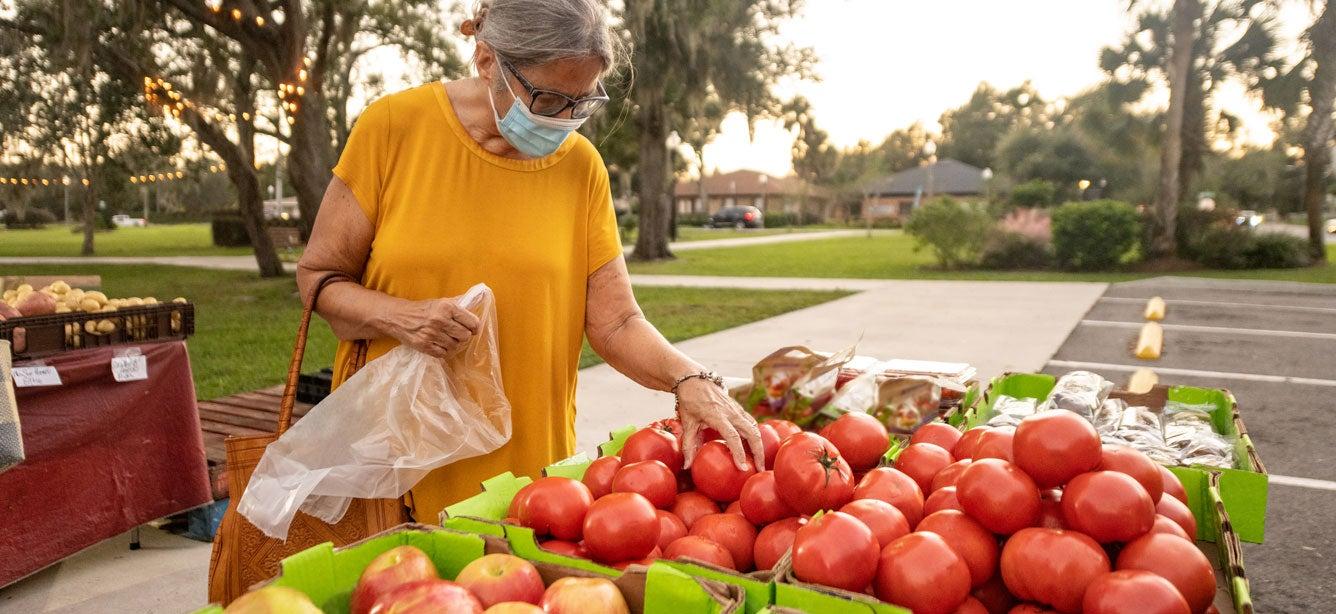
Related Topics
Melanie*, an older adult, has a tenuous relationship with financial security due to a limited income and rising costs.
"Health care is up there,” she says in reference to her biggest expenses. “Like, number one, but then you need food, and you need rent, and your personal items, your toiletries. But then there's nothing left for anything else.”
Another older adult, Jaime*, has similar financial constraints. He spends most of his Social Security money on food and transportation and says he would appreciate having more money to buy more food and some clothing that he needs.
Melanie and Jaime’s financial stressors are not unique among older adults. According to a recent AARP survey, nearly one in four Americans retire without retirement savings.1 And the Aspen Institute has found that almost half of older adults lack the necessary savings to handle emergencies.2 While the perception is that Medicare and Social Security provide a financial safety net for older Americans, the stark reality is that these programs are insufficient. This problem will only get worse as the country is seeing a demographic shift that will see the number of people age 65 and older rise from 58 million in 2022 to 82 million by 2050.
Financial insecurity directly impacts the overall health and well-being of older Americans:
- Financially at-risk individuals are more likely to skip medical check-ups and treatments due to cost, which can worsen existing health issues and lead to more serious, complicated, and costly conditions as they age.
- A third of financially marginalized adults do not receive needed health care due to associated costs, and nearly 30% either skip or take lower doses of prescribed medication.
These findings underscore the importance of addressing financial stability to improve both physical and mental health outcomes, particularly for older adults.
Improving access to financial planning
Many social services are available to support older adults. Yet new research based on the analysis of more than 1 million social care referrals captured in the Unite Us platform reveals that opportunities exist to improve the connections being made between older adults and the services that can help them with financial planning and budgeting.
Unite Us is a technology platform that facilitates closed-loop referrals across coordinated care networks to bridge the gap and allows government, health care, community-based organizations and agencies to connect those in need with social services they might be eligible for. In the health and social services landscape, referral platforms such as Unite Us help connect individuals in need with programs and services to address basic and other unmet needs, including those that offer funds for transportation, utility bills, or medical expenses. Financial planning services such as financial literacy classes and financial counseling are also available to assist older adults and others in improving their financial health.
Analysis of data across the U.S. from the social care platform shows that while organizations seem to be effectively addressing individuals’ immediate basic needs (e.g., food, housing, transportation), there are opportunities to promote connection to programs and services that can help build older adults’ financial stability in the longer term.
Financial planning services are underutilized by older adults despite need
During the study period, more than 150,000 referrals were made for adults age 65 and older for finance-related assistance (e.g., requests for emergency food, rent/mortgage payment assistance, or clothing and household goods), amounting to two-thirds of all referrals for adults 65+. Despite these high levels of financial need, referrals to financial planning programs (such as financial counseling services, financial literacy classes and money management services) constituted less than 1% of all referrals for adults age 65 and older during the same period.
Given the well-documented levels of financial insecurity among older adults, it was surprising to see relatively fewer connections to programs and tools to help older adults understand their financial situation and opportunities to better budget their resources.
Although the data cannot pinpoint the exact reasons for the lack of referrals, we recognize several potential contributing factors:
- Ongoing stigma around financial struggles
- The complexity of financial assistance eligibility
- A lack of awareness among older adults about available services
More work is needed to understand how to promote awareness of and connection to the community-based organizations that offer services that help older Americans build liquid savings, support better financial planning, and cater specifically to the financial needs of older adults.
Financially insecure older adults like Melanie and Jaime deserve to age well and with purpose. Imagine Melanie and Jaime get connected to a local organization that provides short-term financial assistance, helping them avoid turning to predatory loans during times of financial stress. Once they regain financial stability, they can then work with a community-based organization for longer-term financial planning.
By expanding awareness of and access to financial planning resources offered through community-based referral networks, we can create a more comprehensive and accessible system that begins to address the financial hardships facing older adults and potentially mitigate the reliance on other types of assistance programs.
*Pseudonyms to preserve individual privacy. Stories taken from The People Say
Sources
1. S. Kathi Brown. AARP Financial Security Trends Survey, January 2024: Sense of Financial Security Holds Steady, Optimism Up. AARP. April 24, 2024. Found on the internet at https://www.aarp.org/pri/topics/work-finances-retirement/financial-security-retirement/financial-security-trends-survey/
2. Aspen Institute. Rainy Days Don't Retire: Older Adults, Financial Shock,s and the Promise of Emergency Savings Tools. March 2024. Found on the internet at https://www.aspeninstitute.org/wp-content/uploads/2024/03/Aspen-FSP_Rainy-Days-Dont-Retire.pdf



